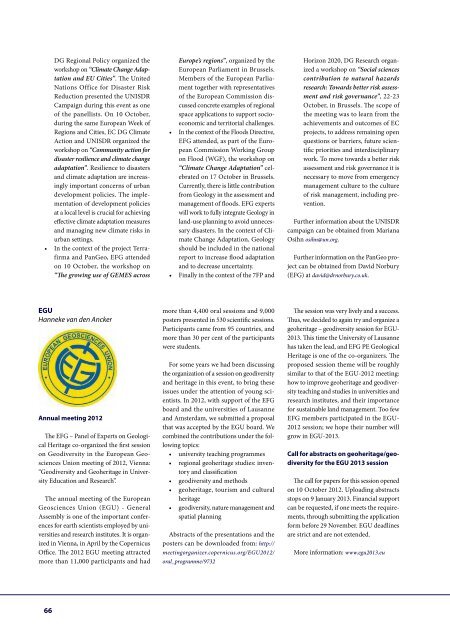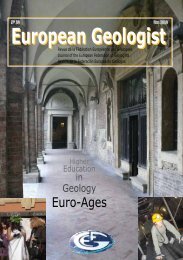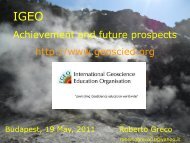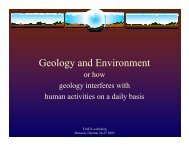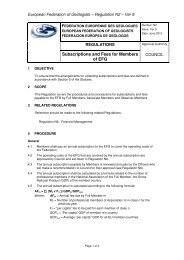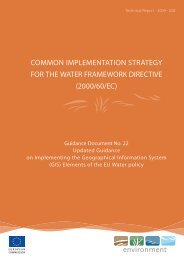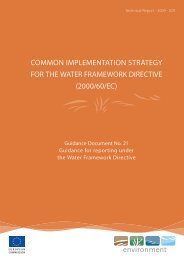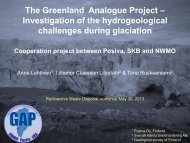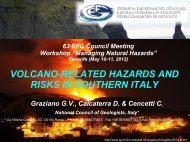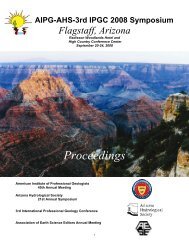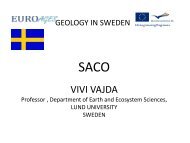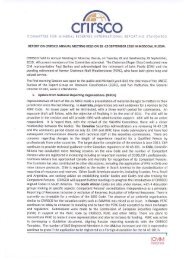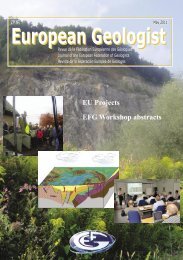European Geologist European Geologist Geoheritage - learning ...
European Geologist European Geologist Geoheritage - learning ...
European Geologist European Geologist Geoheritage - learning ...
You also want an ePaper? Increase the reach of your titles
YUMPU automatically turns print PDFs into web optimized ePapers that Google loves.
DG Regional Policy organized the<br />
workshop on “Climate Change Adaptation<br />
and EU Cities”. The United<br />
Nations Office for Disaster Risk<br />
Reduction presented the UNISDR<br />
Campaign during this event as one<br />
of the panellists. On 10 October,<br />
during the same <strong>European</strong> Week of<br />
Regions and Cities, EC DG Climate<br />
Action and UNISDR organized the<br />
workshop on “Community action for<br />
disaster resilience and climate change<br />
adaptation”. Resilience to disasters<br />
and climate adaptation are increasingly<br />
important concerns of urban<br />
development policies. The implementation<br />
of development policies<br />
at a local level is crucial for achieving<br />
effective climate adaptation measures<br />
and managing new climate risks in<br />
urban settings.<br />
• In the context of the project Terrafirma<br />
and PanGeo, EFG attended<br />
on 10 October, the workshop on<br />
“The growing use of GEMES across<br />
Europe’s regions”, organized by the<br />
<strong>European</strong> Parliament in Brussels.<br />
Members of the <strong>European</strong> Parliament<br />
together with representatives<br />
of the <strong>European</strong> Commission discussed<br />
concrete examples of regional<br />
space applications to support socioeconomic<br />
and territorial challenges.<br />
• In the context of the Floods Directive,<br />
EFG attended, as part of the <strong>European</strong><br />
Commission Working Group<br />
on Flood (WGF), the workshop on<br />
“Climate Change Adaptation” celebrated<br />
on 17 October in Brussels.<br />
Currently, there is little contribution<br />
from Geology in the assessment and<br />
management of floods. EFG experts<br />
will work to fully integrate Geology in<br />
land-use planning to avoid unnecessary<br />
disasters. In the context of Climate<br />
Change Adaptation, Geology<br />
should be included in the national<br />
report to increase flood adaptation<br />
and to decrease uncertainty.<br />
• Finally in the context of the 7FP and<br />
Horizon 2020, DG Research organized<br />
a workshop on “Social sciences<br />
contribution to natural hazards<br />
research: Towards better risk assessment<br />
and risk governance”, 22-23<br />
October, in Brussels. The scope of<br />
the meeting was to learn from the<br />
achievements and outcomes of EC<br />
projects, to address remaining open<br />
questions or barriers, future scientific<br />
priorities and interdisciplinary<br />
work. To move towards a better risk<br />
assessment and risk governance it is<br />
necessary to move from emergency<br />
management culture to the culture<br />
of risk management, including prevention.<br />
Further information about the UNISDR<br />
campaign can be obtained from Mariana<br />
Osihn osihn@un.org.<br />
Further information on the PanGeo project<br />
can be obtained from David Norbury<br />
(EFG) at david@drnorbury.co.uk.<br />
EGU<br />
Hanneke van den Ancker<br />
Annual meeting 2012<br />
The EFG – Panel of Experts on Geological<br />
Heritage co-organized the first session<br />
on Geodiversity in the <strong>European</strong> Geosciences<br />
Union meeting of 2012, Vienna:<br />
“Geodiversity and <strong>Geoheritage</strong> in University<br />
Education and Research”.<br />
The annual meeting of the <strong>European</strong><br />
Geosciences Union (EGU) - General<br />
Assembly is one of the important conferences<br />
for earth scientists employed by universities<br />
and research institutes. It is organized<br />
in Vienna, in April by the Copernicus<br />
Office. The 2012 EGU meeting attracted<br />
more than 11,000 participants and had<br />
more than 4,400 oral sessions and 9,000<br />
posters presented in 530 scientific sessions.<br />
Participants came from 95 countries, and<br />
more than 30 per cent of the participants<br />
were students.<br />
For some years we had been discussing<br />
the organization of a session on geodiversity<br />
and heritage in this event, to bring these<br />
issues under the attention of young scientists.<br />
In 2012, with support of the EFG<br />
board and the universities of Lausanne<br />
and Amsterdam, we submitted a proposal<br />
that was accepted by the EGU board. We<br />
combined the contributions under the following<br />
topics:<br />
• university teaching programmes<br />
• regional geoheritage studies: inventory<br />
and classification<br />
• geodiversity and methods<br />
• geoheritage, tourism and cultural<br />
heritage<br />
• geodiversity, nature management and<br />
spatial planning<br />
Abstracts of the presentations and the<br />
posters can be downloaded from: http://<br />
meetingorganizer.copernicus.org/EGU2012/<br />
oral_programme/9732<br />
The session was very lively and a success.<br />
Thus, we decided to again try and organize a<br />
geoheritage – geodiversity session for EGU-<br />
2013. This time the University of Lausanne<br />
has taken the lead, and EFG PE Geological<br />
Heritage is one of the co-organizers. The<br />
proposed session theme will be roughly<br />
similar to that of the EGU-2012 meeting:<br />
how to improve geoheritage and geodiversity<br />
teaching and studies in universities and<br />
research institutes, and their importance<br />
for sustainable land management. Too few<br />
EFG members participated in the EGU-<br />
2012 session; we hope their number will<br />
grow in EGU-2013.<br />
Call for abstracts on geoheritage/geodiversity<br />
for the EGU 2013 session<br />
The call for papers for this session opened<br />
on 10 October 2012. Uploading abstracts<br />
stops on 9 January 2013. Financial support<br />
can be requested, if one meets the requirements,<br />
through submitting the application<br />
form before 29 November. EGU deadlines<br />
are strict and are not extended.<br />
More information: www.egu2013.eu<br />
66


